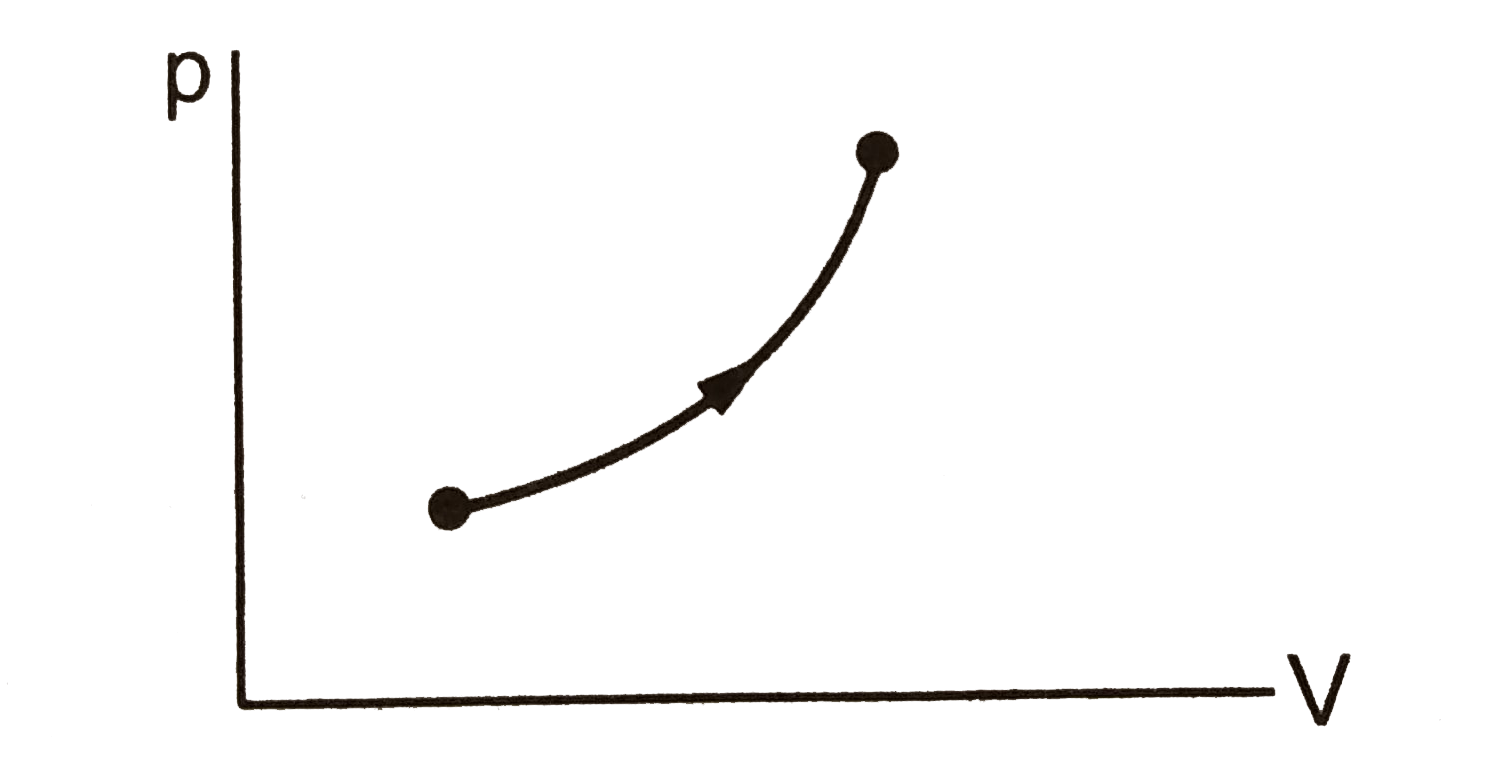Two moles of ideal helium gas are in a rubber balloon at 30∘C. The balloon is fully expandable and can be assumed to require no energy in its expansion. The temperature of the gas in the balloon is slowly changed to 35∘C. The amount of heat required in raising the temperature is nearly (take R
=8.31J/mol.K)
62J
104J
124J
208J
The correct Answer is:D
To solve the problem, we need to calculate the amount of heat required to raise the temperature of 2 moles of ideal helium gas from 30∘C to 35∘C at constant pressure. Here’s a step-by-step solution:
Step 1: Identify the given data
- Number of moles, n=2 moles
- Initial temperature, Ti=30∘C=303.15K
- Final temperature, Tf=35∘C=308.15K
- Change in temperature, ΔT=Tf−Ti=35−30=5K
- Ideal gas constant, R=8.31J/(mol⋅K)
Step 2: Determine the molar heat capacity at constant pressure, Cp
For a monoatomic ideal gas like helium, the molar heat capacity at constant volume, Cv, is given by:
Cv=3R2
Using Mayer's relation:
Cp=Cv+R=3R2+R=5R2
Step 3: Substitute values into the heat equation
The heat added at constant pressure is given by:
Q=nCpΔT
Substituting the values:
Q=2⋅(5R2)⋅ΔT
Q=2⋅(5⋅8.312)⋅5
Step 4: Calculate the heat Q
Now, we simplify the equation:
Q=2⋅(5⋅8.31)⋅5
Q=2⋅41.55⋅5
Q=2⋅207.75
Q=415.5J
Step 5: Final calculation
Since we need the heat required to raise the temperature, we can round it:
Q≈208J
Conclusion
The amount of heat required in raising the temperature is nearly 208J.
- Number of moles, n=2 moles
- Initial temperature, Ti=30∘C=303.15K
- Final temperature, Tf=35∘C=308.15K
- Change in temperature, ΔT=Tf−Ti=35−30=5K
- Ideal gas constant, R=8.31J/(mol⋅K)
For a monoatomic ideal gas like helium, the molar heat capacity at constant volume, Cv, is given by:
Cv=3R2
Using Mayer's relation:
Cp=Cv+R=3R2+R=5R2
The heat added at constant pressure is given by:
Q=nCpΔT
Substituting the values:
Q=2⋅(5R2)⋅ΔT
Q=2⋅(5⋅8.312)⋅5
Now, we simplify the equation:
Q=2⋅(5⋅8.31)⋅5
Q=2⋅41.55⋅5
Q=2⋅207.75
Q=415.5J
Since we need the heat required to raise the temperature, we can round it:
Q≈208J
The amount of heat required in raising the temperature is nearly 208J.
Topper's Solved these Questions
- KTG & THERMODYNAMICSBook:RESONANCE ENGLISHChapter:KTG & THERMODYNAMICSExercise:PART - II
Explore 27 Videos
- KTG & THERMODYNAMICSBook:RESONANCE ENGLISHChapter:KTG & THERMODYNAMICSExercise:Advancel Level Problems
Explore 1 Video
- KTG & THERMODYNAMICSBook:RESONANCE ENGLISHChapter:KTG & THERMODYNAMICSExercise:Exercise-3
Explore 1 Video
- KINETIC THEORY OF GASES AND THERMODYNAMICSBook:RESONANCE ENGLISHChapter:KINETIC THEORY OF GASES AND THERMODYNAMICSExercise:Exercise
Explore 64 Videos
- MAGNETIC FIELD AND FORCESBook:RESONANCE ENGLISHChapter:MAGNETIC FIELD AND FORCESExercise:Exercise
Explore 64 Videos
Similar Questions
A cylinder of fixed capacity 44.8 litres contains helium gas at NTP. Find the amount of heat required to raise the temperature of gas by 15.0∘C.(Given R=8.31J/molK).
View Solution70 calories of heat is required to raise the temperature of 2 mole of an ideal gas at constant pressure from 30^@C to 35^@C . The amount of heat required to raise the temperature of the same gas through the same range at constant volume is

View Solution70 calories of heat is required to raise the temperature of 2 mole of an ideal gas at constant pressure from 30∘C to 35∘C . The amount of heat required to raise the temperature of the same gas through the same range at constant volume is

View SolutionQ cal of heat is required to raise the temperature of 1 mole of a monatomic gas from 20∘C to 30∘C at constant pressure. The amount of heat required to raise the temperature of 1 mole of diatomic gas form 20∘C to 25∘C
View SolutionThe ammount of heat required to raise the temperature of 1 mole of diatomic gas by 1∘C at constant pressure is 60cal . The amount of heat which goes as internal energy of the gas is nearly.
View Solution70 calories of heat required to raise the temperature of 2 moles of an ideal gas at constant pressure from 30∘C→35∘C. The amount of heat required (in calories) to raise the temperature of the same gas through the same range (30∘C→35∘C) at constant volume is:
View Solution70 calories of heat required to raise the temperature of 2 moles of an ideal gas at constant pressure from 30∘C→35∘C. The amount of heat required (in calories) to raise the temperature of the same gas through the same range (30∘C→35∘C) at constant volume is:
View Solution70 calories of heat required to raise the temperature of 2 moles of an ideal gas at constant pressure from 30∘C→35∘C. The amount of heat required (in calories) to raise the temperature of the same gas through the same range (30∘C→35∘C) at constant volume is:
View SolutionA cylinder with fixed capacity of 67.2 lit contains helium gas at STP. The amount of heat needed to raise the temperature of the gas by 20∘C is :[Given that R=8.31] mol−1K−1]
View SolutionTwo moles of an ideal monatomic gas occupies a volume V at 27 °C. The gas expands adiabatically to a volume 2V. Calculate (i) the final temperature of the gas and (ii) change in its internal energy.
View Solution

